Contacts
Student Services Main Desk
512-471-4536
WCH 1.106
Virtual hours, M-F, 8:30 – 4:30pm
Click here to enter via Zoom
Email
Capstone
Capstone Content here.
Handbook
Welcome
Welcome to Health Science Scholars! This Handbook has been prepared as an introduction to the program. You will learn about important people, activities, policies, dates… in fact, much more than you can remember, so bookmark it.
Please take the time to learn about us. You may find that HSS is the most important facet of your university experience. The other honors students you meet may very likely be your friends for life. Through our network of contacts, you will also meet faculty, research supervisors, and health professionals who will be important mentors for you during your careers at UT-Austin and beyond.
Lastly, please notice the wide range of activities the program offers: mentoring, sports, social events, lectures, and much more. You have a unique opportunity to have a hand in making Health Science Scholars all that you want it to be. Without question, performing well in your classes is of paramount importance. However, there is so much more to a university education than what happens in classes. You may look back later and say this was the most enriching period of your life — make up your mind now to get as much as you can from it.
Dr. Laura Colgin
Director, Health Science Scholars
Faculty Steering Committee
Under the leadership of Dr. Laura Colgin, Associate Professor of Neuroscience, members of the faculty steering committee determine program policy, review applications, and serve as informal mentors to Health Science Scholars.
Members are:
Karen Browning
Professor, Department of Molecular Biosciences
Ruth Buskirk
Distinguished Senior Lecturer, Biology Instructional Office
Arturo De Lozanne
Associate Professor, Department of Molecular Biosciences
Johann Eberhart
Associate Professor, Department of Molecular Biosciences
Tony Gonzalez
Associate Professor of Practice, College of Natural Sciences
Craig Hurwitz
Lecturer, Department of Pediatrics Dell Medical School
David Laude
Professor, Department of Chemistry
Brad Love
Associate Professor, Stan Richards School of Advertising and Public Relations
Nico Osier
Assistant Professor, School of Nursing
Inder Saxena
Lecturer, Biology Instructional Office
Dee Silverthorn
Professor of Medical Physiology, Dell Medical School
2022-23 Student Leadership
The Health Science Scholars (HSS) Council aims to enhance the HSS student experience. Our four committees host social events, a mentorship program, Friday Lunch speakers, the Distinguished Lecture Series, and volunteer opportunities. We help connect HSS members to clinical and non-clinical activities, health professionals, and our alumni network to guide our students through their pre-health years in college. It is HSS Council’s goal to create a welcoming, supportive, and educational environment for our members. Elected officers are chosen by each class to represent their interests on our Council. The 2022-2023 Chair is Westley Pollard III.
westley pollard iii
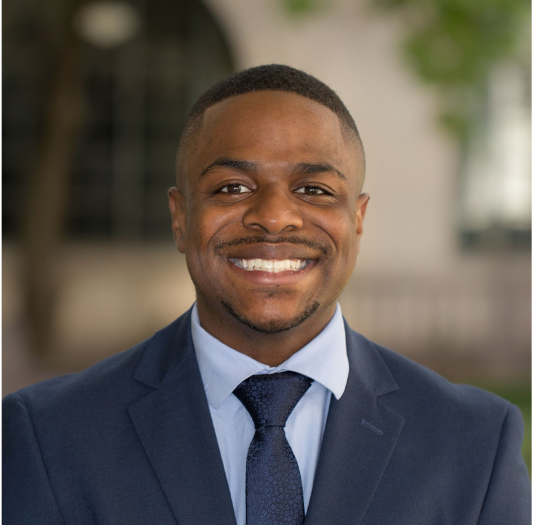 My name is Westley Pollard III, and I am a fourth-year Biology major with a certificate in Spanish for the Medical Professions from Beaumont, TX. Within the Health Science Scholars Council, I serve as our council chair. I’m considering doing my thesis with the Finnell Lab on the co-localization of mitochondrial folate transporters and Fkbp8 protein in mice embryos. Outside of HSS, I am a Terry Scholar, a UT Farm Stand Volunteer, an Undergraduate Teaching Assistant in Originality for the Arts and Sciences, and co-chair of the Health Careers Mentorship Program! During my free time, I enjoy jogging, reading, playing PS5, participating in Intramural Ultimate, and paddleboarding.
My name is Westley Pollard III, and I am a fourth-year Biology major with a certificate in Spanish for the Medical Professions from Beaumont, TX. Within the Health Science Scholars Council, I serve as our council chair. I’m considering doing my thesis with the Finnell Lab on the co-localization of mitochondrial folate transporters and Fkbp8 protein in mice embryos. Outside of HSS, I am a Terry Scholar, a UT Farm Stand Volunteer, an Undergraduate Teaching Assistant in Originality for the Arts and Sciences, and co-chair of the Health Careers Mentorship Program! During my free time, I enjoy jogging, reading, playing PS5, participating in Intramural Ultimate, and paddleboarding.
CHANDNI BHAGTANEY
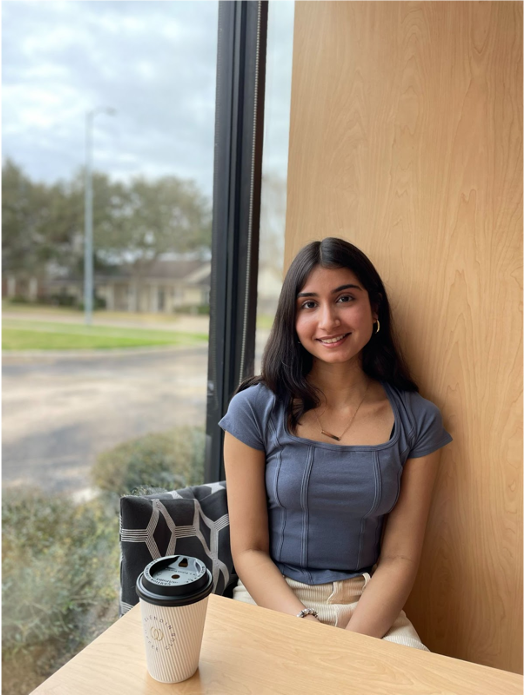 Hi! My name is Chandni Bhagtaney, and I’m from Sugar Land, Texas. I am a sophomore majoring in Public Health and am on the pre-med track. In HSS, I am a part of the Diversity, Equity, and Inclusion Committee. Outside of HSS, I participate in the Aptamer FRI lab stream where I am working to find an oligonucleotide binding species for my protein target. I am really passionate about promoting mental health amongst adolescents and am an officer for NAMI On Campus. Additionally, I am a part of the Longhorn SHARE Project where I am training to provide peer-based mental health support to UT students. I volunteer at Dell Seton and also work towards advocating for health care policies with an organization called PIH Engage. My hobbies include dancing, watching Grey’s Anatomy, and going on scenic walks outside
Hi! My name is Chandni Bhagtaney, and I’m from Sugar Land, Texas. I am a sophomore majoring in Public Health and am on the pre-med track. In HSS, I am a part of the Diversity, Equity, and Inclusion Committee. Outside of HSS, I participate in the Aptamer FRI lab stream where I am working to find an oligonucleotide binding species for my protein target. I am really passionate about promoting mental health amongst adolescents and am an officer for NAMI On Campus. Additionally, I am a part of the Longhorn SHARE Project where I am training to provide peer-based mental health support to UT students. I volunteer at Dell Seton and also work towards advocating for health care policies with an organization called PIH Engage. My hobbies include dancing, watching Grey’s Anatomy, and going on scenic walks outside
JORDAN CHEEK
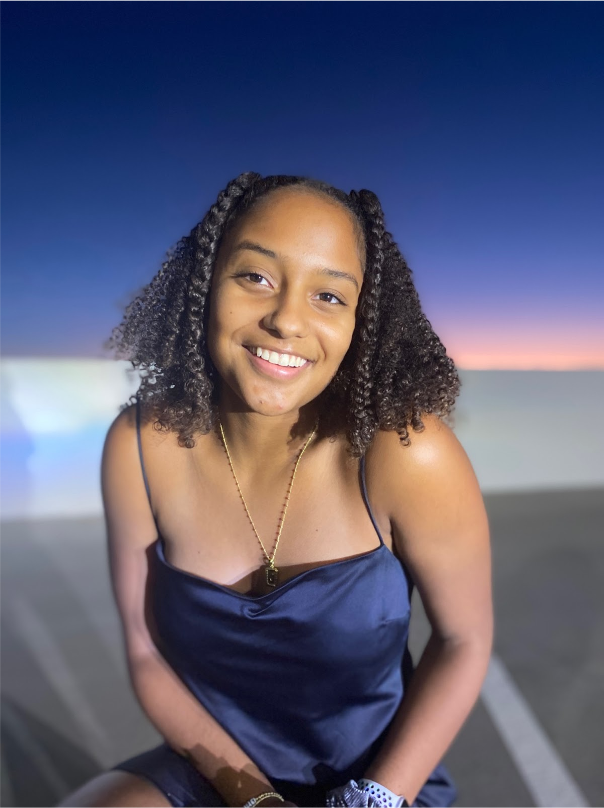 My name is Jordan Cheek, and I am a second year biochemistry major from The Woodlands, Texas, and I serve on the Special Projects Committee. I am also pursuing a Spanish for the Medical Professionals certificate. Outside of HSS, I am involved in Alpha Phi Sigma, a pre-health organization, Black Women's Wellness Organization, and a member of the Virtual Drug Screening FRI where we study virtual libraries of drug-like molecules to identify new drugs. In my free time, I like listening to Harry Styles, and playing tennis and volleyball with friends at Zilker!
My name is Jordan Cheek, and I am a second year biochemistry major from The Woodlands, Texas, and I serve on the Special Projects Committee. I am also pursuing a Spanish for the Medical Professionals certificate. Outside of HSS, I am involved in Alpha Phi Sigma, a pre-health organization, Black Women's Wellness Organization, and a member of the Virtual Drug Screening FRI where we study virtual libraries of drug-like molecules to identify new drugs. In my free time, I like listening to Harry Styles, and playing tennis and volleyball with friends at Zilker!
NIA CHOI
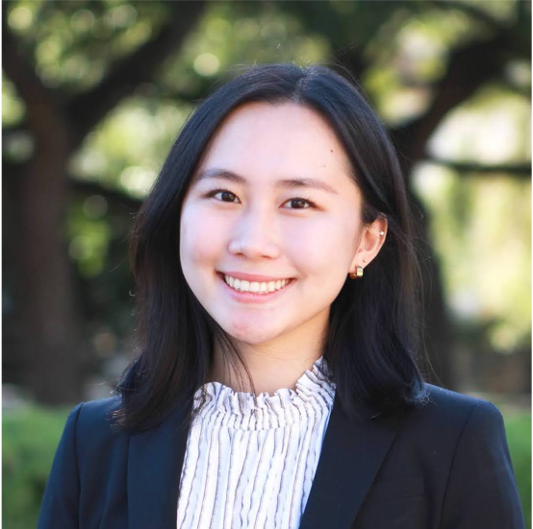 Hi! My name is Nia Choi, and I am a fourth-year pre-medical student majoring in Biochemistry with a certificate in Spanish for the Medical Professions. I am from Houston, TX, but I love Austin! On campus, I am involved in cancer biology research in the Paull lab, FRI mentoring for the BioBricks Stream, Global Medical Missions Alliance, and Crossroads College Ministry. I love to paddleboard, run by Lady Bird Lake, and explore coffee shops. Through HSS, I have gotten to know so many of my closest friends. On the council, I try to help others feel connected too!
Hi! My name is Nia Choi, and I am a fourth-year pre-medical student majoring in Biochemistry with a certificate in Spanish for the Medical Professions. I am from Houston, TX, but I love Austin! On campus, I am involved in cancer biology research in the Paull lab, FRI mentoring for the BioBricks Stream, Global Medical Missions Alliance, and Crossroads College Ministry. I love to paddleboard, run by Lady Bird Lake, and explore coffee shops. Through HSS, I have gotten to know so many of my closest friends. On the council, I try to help others feel connected too!
ANTARA GUPTA
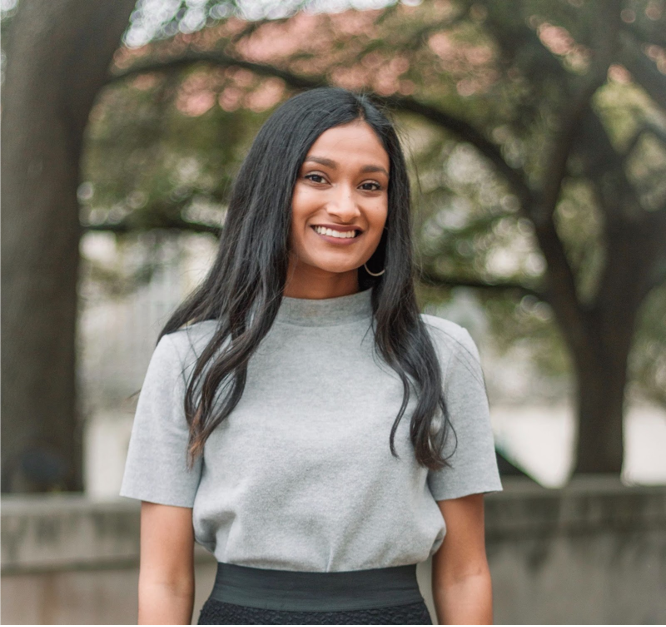 My name is Antara Gupta, and I am a fourth-year pre-medical student majoring in Neuroscience from Frisco, TX. I am also pursuing two certificates in Spanish for Healthcare Professionals and Social Inequality, Health, and Policy. In HSS Council, I head the Diversity, Equity, and Inclusion Subcommittee. Outside of HSS, I am a Natural Sciences Council member, Catalyst (CNS student publication) managing editor, Delta Epsilon Mu (pre-health fraternity) Community Service Chair, and discussion mentor for the Microbe Hackers FRI stream. I am also a research assistant for the LEAP Lab, which focuses on implementing evidence-based practices for mental health in low-resource settings. During my free time, I love thrifting, cooking, exploring new coffee shops, and hiking.
My name is Antara Gupta, and I am a fourth-year pre-medical student majoring in Neuroscience from Frisco, TX. I am also pursuing two certificates in Spanish for Healthcare Professionals and Social Inequality, Health, and Policy. In HSS Council, I head the Diversity, Equity, and Inclusion Subcommittee. Outside of HSS, I am a Natural Sciences Council member, Catalyst (CNS student publication) managing editor, Delta Epsilon Mu (pre-health fraternity) Community Service Chair, and discussion mentor for the Microbe Hackers FRI stream. I am also a research assistant for the LEAP Lab, which focuses on implementing evidence-based practices for mental health in low-resource settings. During my free time, I love thrifting, cooking, exploring new coffee shops, and hiking.
MARK li
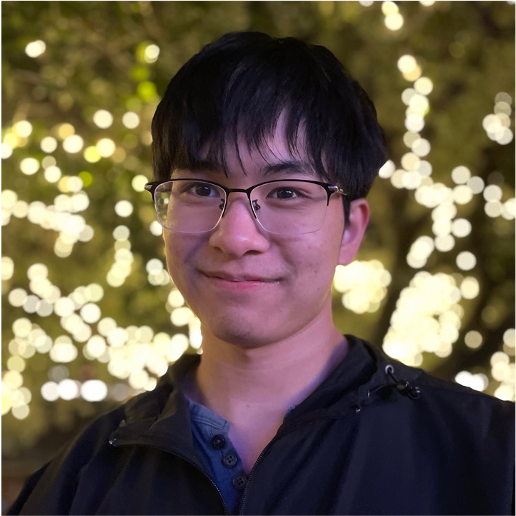 Hi! I’m Mark, a third-year pre-med student majoring in Biochemistry and minoring in Sociology and Informatics. Within HSS, I serve as the Volunteer Committee co-chair. Outside of HSS, I am a member of the Student Health Advisory Committee and StudentsCare, a service organization dedicated towards children in hospitals and the elderly. I’m also an undergraduate researcher for the Yi Lab at Dell Medical School, which explores cancer genomics. Additionally, I just recently finished an EMT class and am looking to get my EMT license. In my free time, I like to swim, run, and lately, learn new meal recipes.
Hi! I’m Mark, a third-year pre-med student majoring in Biochemistry and minoring in Sociology and Informatics. Within HSS, I serve as the Volunteer Committee co-chair. Outside of HSS, I am a member of the Student Health Advisory Committee and StudentsCare, a service organization dedicated towards children in hospitals and the elderly. I’m also an undergraduate researcher for the Yi Lab at Dell Medical School, which explores cancer genomics. Additionally, I just recently finished an EMT class and am looking to get my EMT license. In my free time, I like to swim, run, and lately, learn new meal recipes.
ZINNE NJOKU
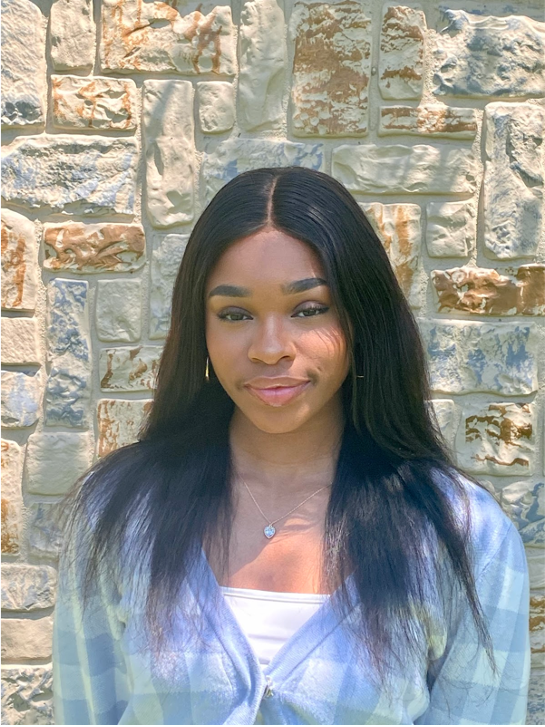 My name is Zinne Njoku and I am a second-year from Sugar Land, Texas majoring in Biochemistry and Public Health with a Pre-Health Professionals Certificate. In HSS, I am a part of the Diversity, Equity, and Inclusion Committee. Outside of HSS, I am a member of the Black Women Wellness Organization and Texas Healthy Habits. For research, I am in the DIY Diagnostics FRI stream, where we find ways to make at home diagnostic services to increase the accessibility and affordability of medicine. In my free time, I enjoy trying new restaurants, reading, and spending time with friends.
My name is Zinne Njoku and I am a second-year from Sugar Land, Texas majoring in Biochemistry and Public Health with a Pre-Health Professionals Certificate. In HSS, I am a part of the Diversity, Equity, and Inclusion Committee. Outside of HSS, I am a member of the Black Women Wellness Organization and Texas Healthy Habits. For research, I am in the DIY Diagnostics FRI stream, where we find ways to make at home diagnostic services to increase the accessibility and affordability of medicine. In my free time, I enjoy trying new restaurants, reading, and spending time with friends.
GIFT OWOLABI
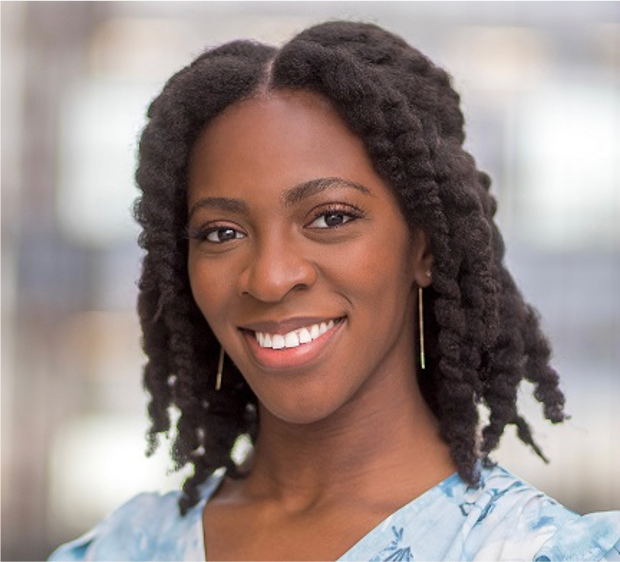 My name is Gift Owolabi, and I am a fourth-year pre-medical student majoring in Biology. I’m also pursuing a minor in American Sign Language and a certificate in creative writing. I’m from Carrizo Springs, TX, and serve on the HSS council's DEI committee. On campus, I’m the president of Delta Epsilon Mu (a pre-health org), a managing editor for Catalyst (student publication), a teaching assistant for Originality in Arts and Sciences, and a member of the Natural Sciences Council. Off campus, I work as a vision therapist and conduct research on gastroesophageal reflux disease with a surgical team at Dell. My hobbies include writing and doing touristy things around Austin like paddleboarding, having fancy dinners, and visiting museums.
My name is Gift Owolabi, and I am a fourth-year pre-medical student majoring in Biology. I’m also pursuing a minor in American Sign Language and a certificate in creative writing. I’m from Carrizo Springs, TX, and serve on the HSS council's DEI committee. On campus, I’m the president of Delta Epsilon Mu (a pre-health org), a managing editor for Catalyst (student publication), a teaching assistant for Originality in Arts and Sciences, and a member of the Natural Sciences Council. Off campus, I work as a vision therapist and conduct research on gastroesophageal reflux disease with a surgical team at Dell. My hobbies include writing and doing touristy things around Austin like paddleboarding, having fancy dinners, and visiting museums.
GABRIELLA SALAZAR
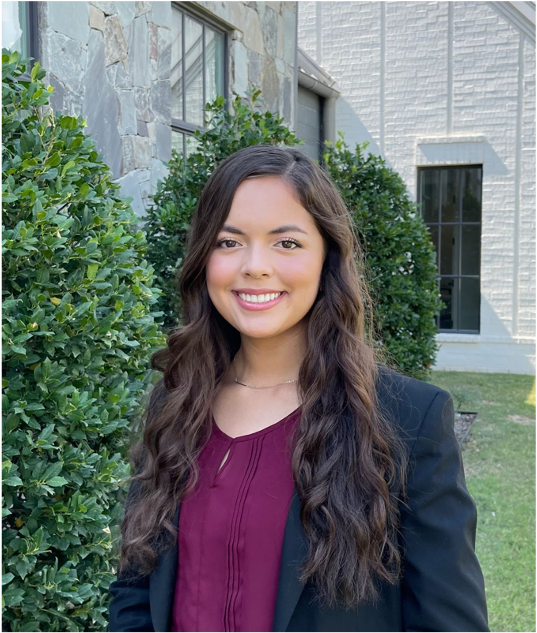 Hi! My name is Gabriella Salazar, and I am a second-year biology major from Frisco, TX. I serve on the Social Committee within the Health Science Scholars Council. Outside of HSS, I volunteer for the UT Farm Stand and I am involved in Project Sunshine. I previously conducted research through the Bioactive Molecules FRI stream, and aspire to transition to a faculty lab. In my free time, I enjoy paddleboarding on Lady Bike Lake, hiking, dancing, and spending time outside.
Hi! My name is Gabriella Salazar, and I am a second-year biology major from Frisco, TX. I serve on the Social Committee within the Health Science Scholars Council. Outside of HSS, I volunteer for the UT Farm Stand and I am involved in Project Sunshine. I previously conducted research through the Bioactive Molecules FRI stream, and aspire to transition to a faculty lab. In my free time, I enjoy paddleboarding on Lady Bike Lake, hiking, dancing, and spending time outside.
REHANA SHAIK
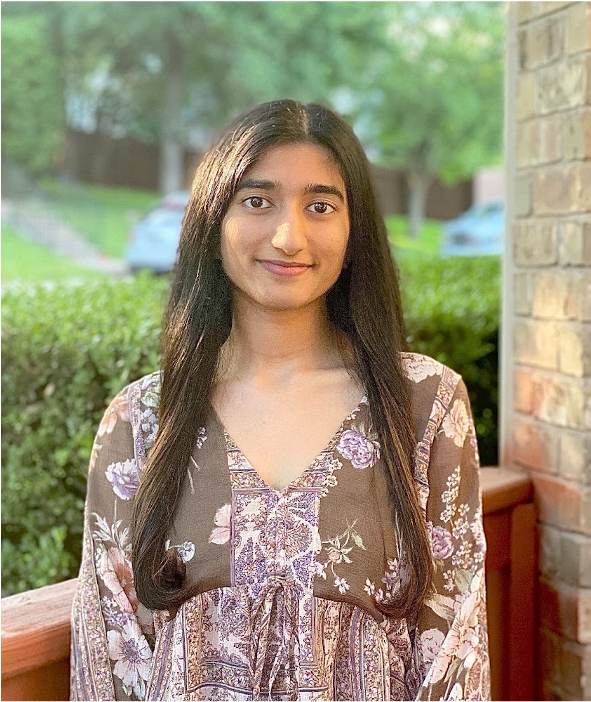 Hi! My name is Rehana Shaik and I am a third-year biochemistry major with a health communications minor from Austin, TX. On HSS Council, I serve as the Volunteer Committee Co-Chair. Outside of HSS, I am a part of the Student Health Advisory Committee which works with the University Health Services to advocate for student health. I also work as an EMT for American Medical Response and volunteer with local elementary students as their reading buddy. With regard to research, I work in the Finnell Lab which works to elucidate the genetic role in neural tube defect formation. In my free time, I love hiking, drinking matcha, reading outdoors, and trying out new recipes!
Hi! My name is Rehana Shaik and I am a third-year biochemistry major with a health communications minor from Austin, TX. On HSS Council, I serve as the Volunteer Committee Co-Chair. Outside of HSS, I am a part of the Student Health Advisory Committee which works with the University Health Services to advocate for student health. I also work as an EMT for American Medical Response and volunteer with local elementary students as their reading buddy. With regard to research, I work in the Finnell Lab which works to elucidate the genetic role in neural tube defect formation. In my free time, I love hiking, drinking matcha, reading outdoors, and trying out new recipes!
KEVIN SHI
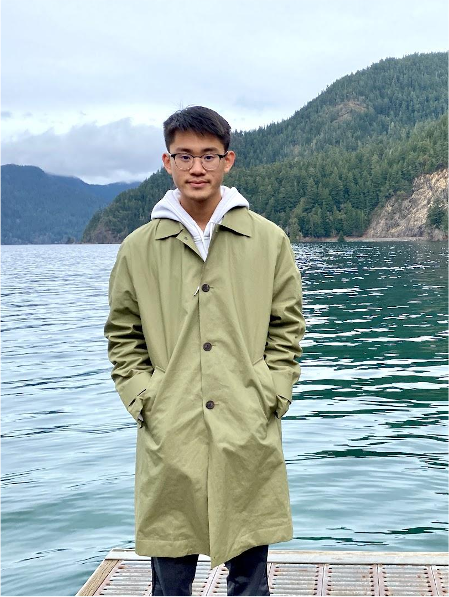 Hi! My name is Kevin Shi and I am a rising senior pre-med majoring in biochemistry hoping to be a pediatrician, and I serve on the Social Committee. At UT, I like being a UGTA and also am part of the Big Fish club, volunteering every Thursday to be mentors to low income children around Austin, Global Medical Missions Alliance, and the Health Career Mentorship Program for shadowing. I am a member of the Sarinay-Cenik lab where we study maternal ribosome inheritance in C. elegans and the Tilman lab where we study child development. I love sports (especially basketball and football), am an avid eater of Chipotle, watching kdramas, paddleboarding, IM frisbee, and playing guitar.
Hi! My name is Kevin Shi and I am a rising senior pre-med majoring in biochemistry hoping to be a pediatrician, and I serve on the Social Committee. At UT, I like being a UGTA and also am part of the Big Fish club, volunteering every Thursday to be mentors to low income children around Austin, Global Medical Missions Alliance, and the Health Career Mentorship Program for shadowing. I am a member of the Sarinay-Cenik lab where we study maternal ribosome inheritance in C. elegans and the Tilman lab where we study child development. I love sports (especially basketball and football), am an avid eater of Chipotle, watching kdramas, paddleboarding, IM frisbee, and playing guitar.
ANELY TAYLOR
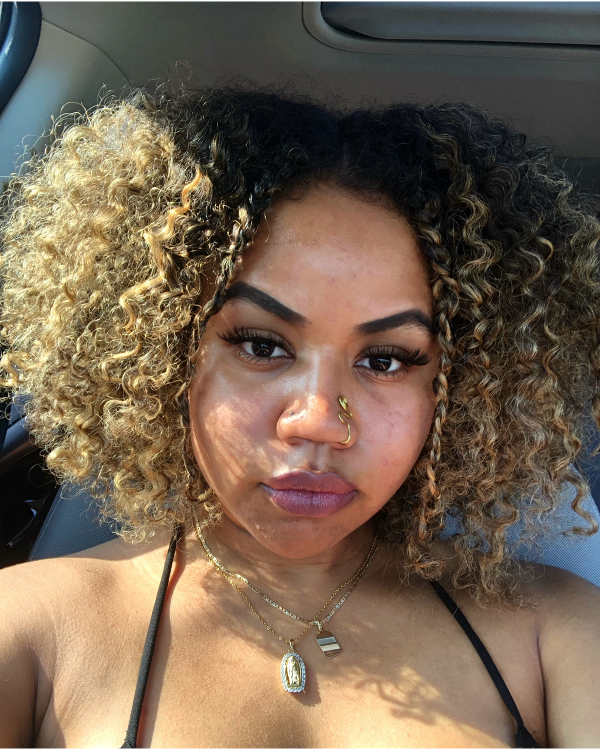 My name is Anely Taylor, I’m a second-year from Alief in Houston. As someone who loves the complexity behind the human brain and ways to improve healthcare as a whole, I’m majoring in Neuroscience and Public Health with a certificate in Pre-Health Professionals. In HSS council I’m part of the Special Projects Committee (SPC), where we mainly focus on networking, bonding and growth projects between HSSer’s and outside Health Professionals. In research, I’m part of the Discovering Signals FRI where we test the effects of cell mediated signaling pathway of eATP on the growth of root hairs of Arabidopsis. Outside of academics I’m involved in organizations such as the Black Health Professionals, Black Women Wellness and the Fearless Leadership Institute. In my free time I enjoy watching Spongebob, playing basketball, painting, swimming, dancing, eating and going on spontaneous adventures with friends.
My name is Anely Taylor, I’m a second-year from Alief in Houston. As someone who loves the complexity behind the human brain and ways to improve healthcare as a whole, I’m majoring in Neuroscience and Public Health with a certificate in Pre-Health Professionals. In HSS council I’m part of the Special Projects Committee (SPC), where we mainly focus on networking, bonding and growth projects between HSSer’s and outside Health Professionals. In research, I’m part of the Discovering Signals FRI where we test the effects of cell mediated signaling pathway of eATP on the growth of root hairs of Arabidopsis. Outside of academics I’m involved in organizations such as the Black Health Professionals, Black Women Wellness and the Fearless Leadership Institute. In my free time I enjoy watching Spongebob, playing basketball, painting, swimming, dancing, eating and going on spontaneous adventures with friends.
ZOE ZHANG
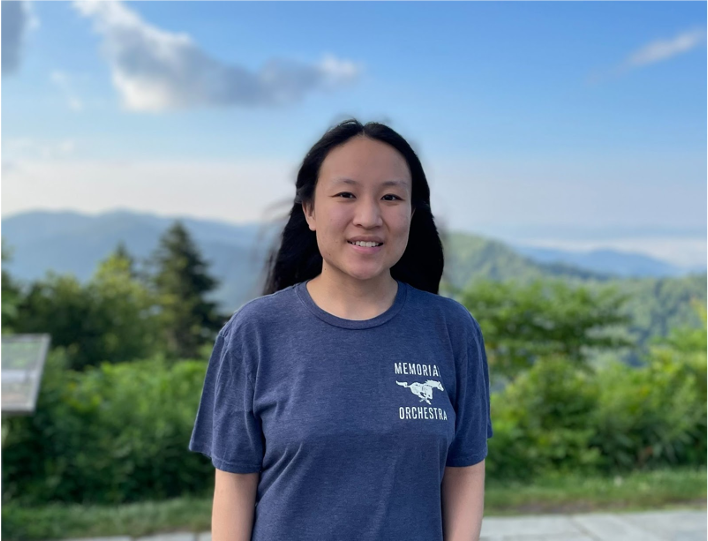 Hello! My name is Zoe Zhang, and I am a third-year Biology major with a Health Communications minor and Spanish for Medical Professions certificate from Houston, TX. I am a part of the Social Committee within HSS Council. Outside of HSS, I am really involved in UT Toastmasters, and I currently serve as the president of the organization. I also enjoy working with kids, as I volunteer with Students Expanding Austin Literacy and Project Sunshine. In terms of research, I’m a peer mentor for the Biobricks FRI stream as well as an undergraduate research assistant in the Zhang lab. My hobbies include cooking/baking, watching anime, and playing games, from social deduction to video games, with my friends.
Hello! My name is Zoe Zhang, and I am a third-year Biology major with a Health Communications minor and Spanish for Medical Professions certificate from Houston, TX. I am a part of the Social Committee within HSS Council. Outside of HSS, I am really involved in UT Toastmasters, and I currently serve as the president of the organization. I also enjoy working with kids, as I volunteer with Students Expanding Austin Literacy and Project Sunshine. In terms of research, I’m a peer mentor for the Biobricks FRI stream as well as an undergraduate research assistant in the Zhang lab. My hobbies include cooking/baking, watching anime, and playing games, from social deduction to video games, with my friends.
Admission Criteria
Application to HSS is separate from, and in addition to, application to the University. Application materials and information about deadlines are available under the How to Apply menu for prospective students. Students may enter the program as freshmen or as college transfers prior to their fourth long semester.
Factors in the admission decision are the student’s high school and/or college grades, class rank, the rigor of the courses the student has taken, the quality of the required application essays, a strong recommendation from a math or science instructor, standardized test scores, and the student’s interest in science, health and service as demonstrated by extracurricular activities. Admission is highly selective.
Program Requirements
Health Science Scholars complete a Bachelor of Science and Arts degree plan in a department within the College of Natural Sciences. The BSA combines a science emphasis with sufficient electives to create a truly cross-disciplinary undergraduate curriculum. Students can augment their science coursework with study in the humanities, communication, business, education, social sciences, or the arts. They can also use their elective hours to pursue research for course credit in or outside their major. After graduation, the student’s transcript will reflect receipt of a BSA-Honors degree if the student has completed the curricular and extracurricular requirements of HSS.
Curricular requirements
All students must complete
-
UGS 303 / Originality in the Arts and Sciences, a first-semester Signature course. Students admitted to HSS after their first semester may substitute a different Signature course.
-
NSC 110H / HSS First-Year Seminar (fall and spring, year 1). Students admitted to HSS after their first year are exempted from this requirement.
-
six credit hours in honors-level coursework in one or more sciences
-
NSC 110H / CNS Honors Seminars (fall, year 2; fall and spring, year 3)
-
NSC 109 / Planning Your Capstone Project (spring, year 2)
-
a Capstone project, which consists of two elements:
-
a substantive health- or service-related learning project — a practicum, internship, or extended volunteering stint of no fewer than 200 hours — or 200+ hours of laboratory research undertaken in the third year; and
-
an honors thesis, written in the student's final year, that emerges from their third-year project.
-
See below for course descriptions and a typical timeline.
Extracurricular requirements
All students must
- contribute at least 3 hours of logged community service each semester in their first year and 6 hours each semester in their second
- participate in at least one HSS-sanctioned service event each semester of their first and second years.
You can read more about the service requirements here.
Students are also required to graduate with a cumulative 3.5 grade point average to receive the BSA-Honors degree.
Placement credit
In general, HSS does not accept placement credit for science courses that are required for a CNS degree. The CNS honors courses challenge our very best students. These courses are integral to the experience of an honors education. Beyond this, medical schools in Texas recommend that their applicants not claim placement credit for biology, chemistry, and physics.
Students may use AP tests to receive credit for lower-division mathematics and physics courses if they wish to be placed in higher-level math or physics. But all students should first discuss this with their advisor before claiming the credit.
HSS does accept placement credit for history, government, social sciences, fine arts, foreign languages, English composition (RHE 306), and the core Humanities requirement (E 316L, 316M, 316N, or 316P). These are the only exceptions to the placement credit rule. Even here, however, whether students should or should not claim a particular credit can be complicated. Many placement tests do not translate as credit for non-elective UT-Austin courses. Again, students should speak with their advisor before claiming credit.
Honors coursework
Health Science Scholars take coursework designed for honors students. Some of these courses are honors versions of courses that are part of the BSA degree plan; others are seminars that count as electives and are required for completing the program.
The following is a typical course timeline, with Honors- and HSS-specific coursework included. Many HSS students elect to take courses during at least one summer, but completing the BSA-Honors degree by itself in four years does not require this. Remember that the pre-health professions path you choose involves courses in addition to degree and HSS requirements, and because there are eight of these, we’ve not listed them here. (By the way, the Health Professions Office maintains a tremendously helpful and user-friendly website that almost certainly contains answers to whatever questions occur about readying yourself for professional school.)
"BSA degree coursework" below refers to either or both major and non-major courses.
Year 1
- BSA degree coursework (fall and spring)
- UGS 303 / Originality in the Arts and Sciences (fall)
- NSC 109 Originality in Scientific Research (fall)
- NSC 110H / HSS First-Year Seminar (fall and spring)
Year 2
- BSA degree coursework (fall and spring)
- Freshman Research Initiative lab hours
- NSC 110H Honors Seminar (fall)
- NSC 109 / Planning Your Capstone Project (spring)
Year 3
- BSA degree coursework (fall and spring)
- NSC 110H Honors Seminar (fall and spring)
- HSS Thesis Planning Workshops (fall and spring)
Year 4
- BSA degree coursework (fall and spring)
- NSC 109 / HSS Thesis Preparation Seminar (fall)
- One of the following:
- Option 1: Departmental research/thesis seminars (fall and spring)
- Option 2: NSC 371 / HSS Capstone Thesis Seminar (spring)
Course descriptions
-
UGS 303 / Originality in the Arts and Sciences
Students in HSS, Dean's Scholars, and Polymathic Scholars are automatically admitted to the Freshmen Research Initiative, and this course, restricted to students in these programs, satisfies the research methods course requirement for the FRI. As its name implies, the course prepares students to undertake original research in both the hard sciences and the humanities. The final project is a competition that requires students, working in teams, to develop an idea for a grant, consult with relevant faculty on constraints, cost projections, and current research in the field, and deliver their proposal to the class. -
NSC 110 / HSS First-Year Seminar
Throughout their first year, HSS students participate in a seminar lead by the program's faculty director that acclimates them to the rigors of a demanding college curriculum, exposes them to guest speakers from the health care professions, and introduces them to some of the College's faculty in an informal setting.
-
NSC 110H / CNS Honors Seminars
One of the advantages of being a CNS honors student is having access to these unique small seminars, which connect students with the university’s best teachers and top researchers. The format of NSC 110H seminars is simple: Faculty select a topic they're passionate about, lead discussions organized around a few readings, and let each student lead part of a class on one of the readings. The seminars foster the honors community by bringing together students in each program and fomenting lively, productive exchanges. -
NSC 109 / Planning Your Capstone Project
The culmination of the HSS curriculum is a two-year research and writing project. Starting in their third year, students spend at least one year in either laboratory research or a practicum related to health, health care, or community service. Both experiences become the foundation of a senior-year Capstone Thesis that itself takes a year to develop and write. The preliminary planning begins in this second-year spring semester course, which is organized around two simple questions: What do you want to do for your Capstone experience, and what do you want your Capstone experience to do for you? Students write reflective essays, interview faculty and community professionals, read and respond to great writers' thoughts on great writing, conduct independent research, and develop a plan for the work they'll undertake in their third year. - HSS Thesis Planning Workshops: These workshops are required for all Health Science Scholars who plan to write their theses in the following academic year. Students take several one-hour workshops to support their progress toward successful completion of their theses.
-
NSC 109 / HSS Thesis Preparation Seminar
Taken in the fall semester of the student's last year, this seminar walks students through a series of steps intended to guide them toward successful completion of a substantial honors thesis. Most of the planning and last-stage research occurs in the fall; most of the writing occurs in the spring. -
NSC 371 / HSS Capstone Thesis Seminar
While working individually with a faculty mentor with expertise in their area of study, students simultaneously enroll in this course in their final semester. Students complete a series of assignments designed to keep them on track. The goal is timely completion of a substantial, honors-quality thesis. They also present their findings at one of several campus events during Research Week in April.
Degree Plans
Health Science Scholars complete the BSA-Honors degree. Requirements specific to HSS can be found in the Program Requirements section above. BSA degree plans for each CNS major that offers a BSA can be found here. For majors that do not offer a BSA, Health Science Scholars complete the BS option.
The HSS Honors Thesis
THE HSS CAPSTONE THESIS PROJECT
OVERVIEW
Through the capstone project, the Health Science Scholars program encourages students to forge connections between experiential learning endeavors and academic scholarship. Many graduates tell us that the capstone thesis is the most rewarding academic accomplishment of their undergraduate career.
As a student in HSS, you will take the first formal step toward developing your thesis project during the spring of your second year at UT, when you take NSC 109: Planning Your Capstone Project. This seminar supports you in identifying your capstone experience—an experiential learning and/or service opportunity such as an internship, volunteering program, or research assistantship related to your interests. You are responsible for securing a position with an organization or lab, completing any necessary training, logging your hours, and taking notes on your observations. You will dedicate a minimum of 200 hours to this experience, either entirely or mostly before the beginning of your final year in HSS, so that you have a broad range of experience to draw upon as you develop your thesis. When deciding on a capstone experience, carefully consider your interests, goals, and the kinds of tasks you will be expected to perform. You’ll be spending a great deal of time and energy on your capstone project, so choose an experience that you imagine leading to a thesis topic you are genuinely eager to explore.
Alongside your capstone experience, during your third year at UT you will take a series of one-hour thesis planning workshops that will help you prepare for developing the thesis you will write the following year.
During your final year in the program, you will write a capstone thesis. The thesis is a persuasive, well-reasoned, evidence-based paper that answers a question related to your capstone experience. In the thesis, you will engage in and contribute to the scholarly conversation on your topic and report on your own findings. Keep in mind that theses are not kept confidential, so you should choose a thesis topic you feel comfortable discussing and sharing with others. Thesis projects vary substantially based on the capstone experience, especially depending on whether you are on the Option 1 (departmental honors) track or the Option 2 (college honors) track. Usually, about 75–80% of students in any given class are on the Option 2 track.
OPTION 1 AND OPTION 2 TRACKS
Students on the Option 1 track (for departmental honors) pursue conventional science research in their major field of study (or in a lab approved by the faculty honors advisor in their major) under the supervision of the lab’s principle investigator (PI). The PI’s supervision is often supplemented by an advanced graduate student or post-doc. If you are on the Option 1 track, you are expected to conduct original research and take responsibility for some individual project in your lab. You should discuss this with your PI and agree on an individual project no later than the middle of your third year.
Students on the Option 2 track (for college honors) pursue an internship, volunteering program, extended service project, or other approved practicum experience. The experience exposes you to challenges faced by experts in the field and provides inspiration for your thesis project. You may engage in service or research at or beyond UT Austin to fulfill your Option 2 capstone experience. For example, a recent HSS graduate provided translation services for Spanish-speaking patients at a health clinic serving low-income clients; one student conducted survey research for a local non-profit organization; another student worked on website content development and management for Austin Public Health; and a different student assisted with a UT faculty member’s research related to public policy and elder care in Austin.
Below, you’ll find more information on the Option 1 (departmental honors) thesis, followed by a similar discussion for Option 2.
THE OPTION 1 THESIS (departmental honors/lab research in the major)
Option 1 thesis requirements and expectations are dictated by your major department and PI. Most departments will require you to enroll in two semesters of thesis hours (usually 379H in your major department) during your final year in order to earn departmental honors.
An Option 1 thesis typically reports directly on the research you conduct in the lab, and often resembles a manuscript intended for a discipline-specific audience in the relevant field. Length and format vary considerably. You should discuss expectations and deadlines for your thesis project with your PI and any other mentors in your lab to ensure that your expectations align. Be sure to request feedback on a rough draft of your thesis well before the final deadline, which will likely be close to the end of the spring semester of your final year. As a student, it is your responsibility to initiate and maintain contact with your PI and other mentors regarding your research and your thesis.
THE OPTION 2 THESIS (college honors/internship, service, or practicum beyond the major)
Option 2 students meet programmatic expectations for the thesis, which are conveyed through workshops during your third year as well as through HSS thesis seminars during your final year (NSC 323: Thesis Preparation Seminar in the fall and NSC 371: Capstone Thesis Seminar in the spring). These seminars provide structure, accountability, and deadlines for the development of your thesis project and writing process.
The typical Option 2 thesis is about 8,000 to 12,000 words (or more if you are also in Plan II), and it is written for a well-educated but non-specialist audience. Most Option 2 theses do not report directly on work produced for the capstone experience, although they may if appropriate. Your thesis project will be inspired by your observations during your capstone experience as well as reading in the scholarly literature related to your topic, which will help you craft your research question (or related set of questions) for your thesis.
No later than the beginning of your final year, you will secure the support of at least two UT faculty members with expertise relevant to your project to serve as mentors for your thesis: either a primary supervisor and a second reader, or co-supervisors. Unless your capstone experience supervisor is a faculty member at UT, they probably will not be eligible to serve as your primary thesis supervisor, as the thesis is an academic, graded project. As a student, it is your responsibility to initiate and maintain contact with your thesis supervisor(s) and mentors regarding your research and your thesis. Before asking a faculty member to supervise your thesis, be sure to review the HSS faculty mentor guidelines in the following section of the handbook.
Option 2 thesis projects may involve original data collection, or they may present original analysis of existing data or scholarly literature. For example, students have performed content analyses, literature reviews, systematic or scoping literature reviews, policy reviews, and developed proposals for future research as part of satisfactory HSS theses. We encourage you to talk with faculty mentors about appropriate and feasible methodological approaches starting no later than the spring of your junior year. Students who want to conduct human subjects research will need IRB approval, and should start the IRB process no later than the spring before their thesis year.
Option 2 theses are evaluated independently by your faculty mentors and a CNS Honors instructor. Thus, your work will be reviewed by professors with expertise relevant to your area of study while also maintaining consistency of evaluation across the breadth of the program.
SAMPLE THESES
Students will be offered (or may request) current sample theses to read as they prepare to write their theses during their third and fourth years. We also offer the following sample HSS theses for further exploration.
Theses aimed at synthesizing and analyzing existing research (systematic literature review):
- Farzam Farahani, “Using Psychosocial Therapy to Improve the Quality of Life of Patients with Neurofibromatosis Type 1: A Review”
- Imogen Clover-Brown, “Delivering Prenatal Care through Telemedicine in Rural Latin America: A Review”
Theses that report on original data collected outside the science lab context:
- Emily Gao, “Factors Associated with Unmet Health Care Needs in Home Care Workers”
Theses that report on original data collected in the science lab (departmental honors) context:
- Ryan Huizar, “Identification and Characterization of Novel Ciliogenic Machinery” [https://repositories.lib.utexas.edu/handle/2152/46731]
- Ashley Ciosek, “Elucidating Small RNA Regulation in the Vibrio Cholerae Csr System” [https://repositories.lib.utexas.edu/handle/2152/74903]
HSS CONTACTS
Questions about the capstone experience and thesis supervisor eligibility may be directed to Sara Corson, Director of CNS Honors. Questions about thesis preparation workshops and thesis seminars may be directed to Rebecca Wilcox, the Option 2 thesis seminar instructor. Students with questions about Option 1 eligibility or other academic considerations should contact their academic advisor, Mark Hemenway.
Faculty Mentor Guidelines
THE HEALTH SCIENCE SCHOLARS CAPSTONE THESIS PROJECT
Overview
HSS is a multidisciplinary honors program for undergraduates in the College of Natural Sciences who have a strong interest in the health professions.
By the end of their second year, HSS students must identify a “capstone experience”—an experiential learning and/or service opportunity such as an internship, volunteering program, or research assistantship related to their interests. They must dedicate a minimum of 200 hours to this experience (with some exceptions granted due to the COVID-19 pandemic). During their third (pre-thesis) year, students also take a series of workshops sponsored by CNS Honors to help them prepare for developing their thesis the following year.
During their final year in the program, students write a capstone thesis. The thesis is a persuasive, well-reasoned, evidence-based paper that answers a question (or interrelated set of questions) aligned with the student’s capstone experience. Students engage in and contribute to scholarly conversations on their thesis topics as well as reporting on their own findings. Some students will revise their theses for publication, either in an undergraduate research journal or in a discipline-specific journal related to the field (with their faculty supervisor’s support).
The HSS program encourages students to seek multiple mentors for their capstone projects, but requires students to secure the support of at least two UT faculty members (or, for a second reader, another appropriate and approved mentor with relevant expertise) to supervise their thesis work. Students are responsible for maintaining contact with their faculty mentors, setting up meetings, and asking for discipline-specific guidance. Faculty mentors are responsible for offering guidance on conceptual development and feedback on the written draft. They are also responsible for submitting a grade recommendation for the thesis at the end of the spring term. For additional detail, see below.
Option 1 and Option 2 Tracks
Students on the Option 1 track (for departmental honors) pursue conventional science research in their major field of study (or in a lab approved by the faculty honors advisor in their major) under the supervision of the lab’s principle investigator (PI). The PI’s supervision is often supplemented by an advanced graduate student or post-doc. The student is expected to conduct original research and take responsibility for some project or significant component of a project in the lab.
Students on the Option 2 track (for college honors) pursue an internship, volunteering program, extended service project, or other approved practicum experience. The experience exposes the student to challenges faced by experts in the field and provides inspiration for the student’s thesis project. Students may engage in service or research at or beyond UT Austin to fulfill their Option 2 capstone experience; for example, a student may translate for English language learners at a health clinic that serves low-income clients; they may conduct survey research for a local non-profit organization; they may work on website content development and management for Austin Public Health; they may support a faculty member’s research on public policy related to elder care through data analysis, interviews, or conducting a literature review.
Below, we discuss the Option 1 (departmental honors) thesis and student-faculty relationship in greater depth, followed by a similar discussion for Option 2. Then we offer broad grading guidelines and suggestions for ways you may be able to support a struggling student under your supervision.
THE OPTION 1 THESIS (departmental honors/lab research in the major)
Option 1 Overview
Option 1 thesis requirements and expectations are dictated by the student’s major department and their PI. The Option 1 thesis typically reports directly on the research the student conducts in the lab, and often resembles a manuscript intended for a discipline-specific audience in the relevant field. Length and format vary considerably; departmental honors theses are typically not less than 20 pages (with single-spacing), but may be longer; they usually include multiple graphics or images that visually support the written discussion of the student’s research. Students or faculty who are not familiar with departmental thesis expectations should reach out to the honors faculty advisor for their department.
Option 1 Coursework
Most departments in CNS require departmental honors students to take two semesters of thesis hours in the major field of study. For example, a Biology major conducting lab work under the supervision of a Biology professor would take BIO 379H for the last two semesters they are working on the capstone thesis project (typically fall and spring of the student’s senior year).
In addition, Option 1 HSS students take a one-hour thesis writing seminar (NSC 110H) sponsored by CNS Honors during their final semester of thesis-writing. This seminar offers the student support and accountability for the writing process as well as opportunities for peer feedback.
Option 1 Faculty Supervision
For Option 1 students, the primary thesis supervisor should be their PI. The student should seek the additional guidance of a second reader, whether that is another faculty member in the department or another member of the lab group, typically an advanced Ph.D. (or M.D.) student or a post-doctoral fellow. In some cases, the department’s honors faculty advisor will serve as a second reader and/or sign off on the thesis, per departmental guidelines.
Option 1 students should occasionally meet individually with their PI in addition to lab group meetings that the student may attend. The PI should help the student identify an appropriate project that the student can take responsibility for within the lab setting—this typically happens during fall or early spring of the student’s third (pre-thesis) year, but may occur earlier.
In the student’s final semester of thesis writing, the PI should be willing to help the student stay on track with writing the thesis and should offer feedback on at least one rough draft of the thesis well before the department’s submission deadline.
Option 1 Thesis Submission and Evaluation
For Option 1, the student’s departmental honors contact or PI is responsible for setting a reasonable thesis submission deadline that allows for timely submission of a grade for 379H and also for submitting the student’s grade to the Registrar. CNS Honors is not involved in the grading process for departmental honors students.
Please scroll past the Option 2 section below to review broad grading guidelines relevant to both types of theses.
THE OPTION 2 THESIS (college honors/internship, service, or practicum beyond the major)
Option 2 Overview
Option 2 students meet programmatic expectations for the thesis rather than departmentally-defined requirements. The typical Option 2 thesis is about 30–40 pages (or 60 for students double majoring with Plan II), double-spaced, plus references and any graphics or appendices the student may choose to include. It should be written for a well-educated but non-specialist audience.
Unlike the Option 1 thesis, the Option 2 thesis typically does not report directly on work produced for the capstone experience, although it may. Rather, many Option 2 theses are inspired by students’ observations during their capstone experience, which leads to a research question or related set of questions. Option 2 thesis projects may involve original data collection, or they may present original analysis of existing data or scholarly literature. For example, students have performed content analyses, systematic literature reviews, policy reviews, and developed proposals for future research as part of satisfactory HSS theses. We encourage students to talk with faculty mentors about appropriate and feasible methodological approaches early in the student’s thesis year, if not before.
Students who want to conduct human subjects research will need IRB approval, and should start the IRB process no later than the summer before their thesis year.
Option 2 Coursework
Option 2 students take the HSS program’s thesis seminar sequence, NSC 323 in the fall and NSC 371 in the spring of their final year in the program. Broadly, these seminars offer scaffolding, support, and accountability for the student, and we hope that they reduce the burden of supervision on the student’s faculty mentors. The seminars typically meet once per week.
In the fall semester seminar (NSC 323), the seminar instructor, Dr. Rebecca Wilcox, leads students through the process of refining their topic in response to existing research; exploring library research databases relevant to their area of interest; reading at least one sample thesis; developing a log of at least 20 academic sources for the thesis (though students will need to continue to read additional sources well into the spring semester); writing a detailed annotated bibliography to help prepare them for the kind of writing and analysis we expect of the thesis itself; beginning an outline for the thesis project; evaluating their own writing and the writing of peers; and drafting the first few pages of their thesis. Students work in pairs and small groups regularly to brainstorm and share feedback. In addition, students meet one-on-one with their instructor and a graduate teaching assistant at least once per semester.
In the spring thesis seminar, students are required to submit incremental rough drafts of the thesis about every two weeks, adding at least five pages to their draft with each submission. Each draft receives feedback from either an instructor/graduate TA or a CNS Honors classmate. Students also refine and expand their outline; write and revise an abstract; workshop use of sources and citations; reflect on feedback they receive from instructors and peers; and peer review visual aids and practice for their thesis presentations (which occur in April and are graded as part of the course). As in the fall, students meet one-on-one with their instructor and a graduate TA at least once.
Thus, the Option 2 thesis seminars provide structure and support for the student’s development of their thesis, allowing faculty supervisors to focus on methodological and discipline-specific considerations in the student’s research and drafting. Please keep in mind that the thesis seminar serves students in a wide range of disciplines studying an even wider range of self-designed topics; our emphasis is on broadly-applicable process development for literature research and writing.
Option 2 Faculty Supervision
The student must secure the support of at least two UT faculty members to serve as mentors for the thesis project: either a primary supervisor and a second reader, or co-supervisors. Co-supervisors may be particularly appropriate if the student’s mentors need to share time commitments or offer complementary disciplinary expertise, or if the student identifies a strong mentor with expertise in the field who is not a faculty member in an academic department at UT. In general, supervisors and second readers will be affiliated with UT Austin; exceptions may be granted on a case-by-case basis. An advanced doctoral student with expertise in a relevant area may be approved to serve as second reader with the permission of the primary supervisor.
Students seek out faculty in departments and research units related to their capstone experiences in order to identify mentors who bring different perspectives to their topics. Mentors help guide the student’s research and they help brainstorm directions, approaches, and methodologies. They are not responsible for defining the student’s thesis topic for the student. Option 2 students are responsible for identifying and setting up meetings with relevant faculty members; the thesis seminar instructor is happy to support the student through brainstorming if necessary.
Students should identify a primary thesis supervisor no later than the beginning of the fall semester of the thesis year. The student should identify a second reader or co-supervisor before the fall (Thanksgiving) break of the senior year.
The student should meet with the primary supervisor(s) occasionally to discuss readings, possible thesis topics, methods, data collection (if applicable), structure, and written content appropriate to the discipline in which the student’s project is grounded. At minimum, the thesis supervisor should be willing to meet (or communicate) with the student at least once per month during the fall of the thesis year and at least every two to three weeks during the spring of the thesis year. In addition, the thesis supervisor should be willing to complete a very brief progress report, comment on at least one rough draft of the thesis in the spring, and provide a grade for the final thesis at the end of the spring term. Loose grading guidelines are offered below.
The responsibilities of the second reader are similar to that of the primary supervisor, but somewhat reduced in scope. We suggest that a second reader be willing to meet with the student at least twice in the fall semester for brainstorming and/or to review the student’s reading list, and to meet at least twice again in the spring to discuss the thesis itself. Second readers should plan to offer the student feedback on at least one rough draft of the thesis in mid- to late spring. Starting in the 2022-23 academic year, we ask that second readers participate in evaluating their student’s thesis, either independently or in coordination with the primary supervisor, by submitting a recommended grade at the end of the spring term.
Option 2 Thesis Submission and Evaluation
For Option 2, the student’s final thesis has traditionally been due on the Tuesday after the last class day in the spring semester. Given recent changes to the academic calendar, the thesis seminar instructor will be sure to communicate with Option 2 supervisors about our deadline in the spring semester. If you will need your student to submit their final thesis to you before the CNS Honors deadline very soon after the last class day, please make sure to communicate this to your student as soon as possible.
Option 2 thesis grades are integrated into the course grade for NSC 371; thus, the thesis seminar instructor is responsible for submitting student’s grades to the Registrar. The student’s faculty mentors will be prompted to submit their thesis grade recommendations to the seminar instructor via a secure Qualtrics form.
GRADING GUIDELINES FOR CNS HONORS THESES
The following guidelines are intended to support the evaluation of undergraduate student theses across multiple disciplines; please use your own best judgement in evaluating how your student has met these expectations within the context of your shared discipline.
- A grade of A (exemplary) on the final thesis should demonstrate thorough research through a familiarity with authoritative sources and methods of the discipline, a well-reasoned analysis of the research methods and sources used, direct application of the research to the argument being made, a cogent conclusion based on the research, and superior written presentation of the thesis argument.
- A grade of B (better than required) should demonstrate all of the above, but may use fewer or less appropriate research sources and methods, and sufficient (rather than superior) written presentation.
- A grade of C (as required but no better) will indicate a basic grasp of the data and appropriate sources, limited application of the research towards the argument being made, and merely acceptable written style.
- A grade of D (barely passable) indicates minimally acceptable research findings in addition to poor analysis and writing standards.
- A grade of F is appropriate where the thesis represents a crudely thrown-together last-minute effort or even evidence of unoriginal work.
If you have questions about the evaluation of your student’s work or if you suspect academic dishonesty, please contact your department chair or department honors faculty advisor (for Option 1 students in 379H) or Rebecca Wilcox, the thesis seminar instructor (for Option 2 students in NSC 371).
COMMON STUDENT CHALLENGES AND SUGGESTED RESPONSES
Many faculty members have worked with undergraduate researchers before and have developed a repertoire of responses to common student challenges. However, faculty members who are new to undergraduate thesis supervision may find some of the suggestions below helpful in understanding and responding to students facing common challenges or pitfalls as they develop their thesis projects.
Lack of experience in the field
• Ask the student about their coursework and reading to determine relative level of knowledge and experience.
• Point the student to key publications or researchers in the field.
• Gently challenge assumptions and misconceptions. Point them to more nuanced or up-to-date perspectives in the literature.
• Help the student identify a paper providing a positive example of the methodological approach.
• Remind the student that subject librarians can help identify and navigate relevant databases.
Normalized over-achievement
• Remind the student that the thesis is the most significant academic project they have undertaken, and everyone struggles with their first big project.
• Remind the student that there's no such thing as a perfect thesis.
• Suggest that the student list and prioritize their commitments, and consider letting one go.
Imposter syndrome
• Remind the student that they are not expected to produce publishable work (in scope or quality).
• Remind the student that we were all beginners once.
• Remind the student that they are doing the best they can under the circumstances they are in now; they can’t control external factors.
Lack of communication
• Remind the student that you want to help them meet their goals.
• Ask the student if they are embarrassed about their writing and remind them that rough drafts are meant to be rough. Focus on ideas over expression.
• Schedule biweekly meetings, and set expectations and agendas in advance to promote accountability.
• Ask the student to send you weekly updates on their progress.
• Consider contacting Rebecca Wilcox to nudge the student.
Competing commitments
• Suggest that the student list and prioritize their commitments.
• Ask the student about their goals and values. What is most important?
• Suggest that a counselor may be able to help them evaluate priorities.
Mental health concerns
• Ask the student if they have spoken to a counselor or therapist about managing anxiety, stress, conflicting priorities, or personal hardships.
• Contact BCCAL at 512-232-5050 or https://safety.utexas.edu/behavior-concerns-advice-line.
For Option 2, if you are not confident that you are able to continue working with the student for any reason, please contact the thesis seminar instructor at rebecca.wilcox@austin.utexas.edu as soon as possible. Perhaps she can mediate between you and the student; if not, she will try to support the student in finding another faculty mentor.
HSS CONTACTS
Questions about the capstone experience and thesis supervisor eligibility may be directed to Sara Corson, Director of CNS Honors. Questions about the thesis seminar and thesis evaluation for Option 2 may be directed to Rebecca Wilcox, the thesis seminar instructor. Students with questions about Option 1 eligibility or other academic considerations should contact their academic advisor, Mark Hemenway.
Honor Code
“The core values of The University of Texas at Austin are learning, discovery, freedom, leadership, individual opportunity, and responsibility. Each member of the university is expected to uphold these values through integrity, honesty, trust, fairness, and respect toward peers and community.”
This Code of Conduct was created by University of Texas at Austin students, staff, and faculty and was adopted by the university in 2004.
Scholarships
All students admitted to Dean's Scholars are automatically considered for a CNS scholarship by the Director of Dean's Scholars and the Associate Dean for Undergraduate Education. Applicants must complete and submit their Dean's Scholars application by December 1st.
Students who do not receive scholarships as entering freshmen can apply for a number of scholarships available to continuing students starting their second semester at UT-Austin. Click Here for scholarships information for current students.
How to Apply
There are two gateways to Health Science Scholars: one for high school seniors applying to UT-Austin, the other for college transfer students.
HIGH SCHOOL SENIORS
All incoming, non-transfer students may apply via either the ApplyTexas or Common App, or the separate Honors application at UT-Austin’s Admissions site by December 1. Students who have submitted their application to UT-Austin but did not apply to Health Science Scholars must use the separate Honors application to apply. Application to Health Science Scholars is restricted to students applying to the College of Natural Sciences.
CURRENT UNIVERSITY OF TEXAS STUDENTS AND TRANSFER STUDENTS
The transfer application portal is currently undergoing maintenance. This website will be updated when the appliction becomes available. Deadline for the spring semester is December 15; for the fall semester, July 31. Students who have completed more than three semesters of college coursework are not eligible for transfer admission to Health Science Scholars. Applications require a short essay, a résumé, and a letter of recommendation from a math or science instructor. Detailed instructions are on the application itself.
If you have any questions about the application process, please contact:
CNS Honors Center
T.S. Painter Hall (PAI), room 5.39 (mail code G2550)
The University of Texas at Austin
Austin TX 78712-2550
(512) 232-1048
cns.honors@austin.utexas.edu
- Departments & Schools
- Astronomy
- Chemistry
- Computer Science
- Integrative Biology
- Marine Science
- Mathematics
- Molecular Biosciences
- Neuroscience
- Statistics and Data Sciences
- Physics
- Human Ecology
- Human Development and Family Sciences
- Nutritional Sciences
- Students
- Advising Centers
- Career Services
- Health Professions Office
- Honors Office
- Office for Undergraduate Research
- Biology Instructional Office
- Dean's Office
- College Leadership
- Strategic Plan
- Business Services
- Communications & Events
- Office of Development
- Faculty Affairs
- Information Technology
- Research & Facilities
- Undergraduate Education
- Graduate Education
College of Natural Sciences
The University of Texas at Austin
120 Inner Campus Dr Stop G2500
Austin, TX 78712
Campus Map »
Student Inquiries: 512 471 4536
General Inquiries: 512 471 3285
Login »
Sitemap »
Help »
© Copyright 2019
College of Natural Sciences
The University of Texas at Austin














